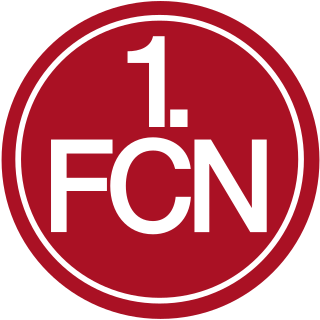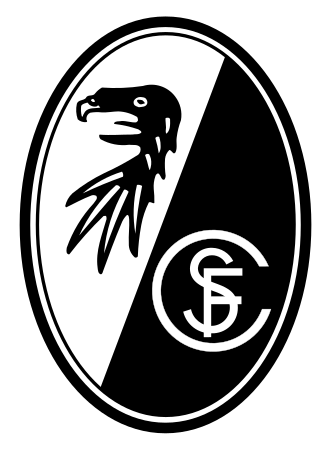
Fußballclub Gelsenkirchen-Schalke 04 e. V., commonly known as FC Schalke 04, Schalke 04, or abbreviated as S04, is a professional German football and multi-sports club originally from the Schalke district of Gelsenkirchen, North Rhine-Westphalia. The "04" in the club's name derives from its formation in 1904. Schalke have been one of the most popular professional football teams in Germany, even though the club's heyday was in the 1930s and 1940s. Schalke play in the 2. Bundesliga, the second tier of the German football league system, following relegation from the Bundesliga in 2022–23. As of 2023, the club has 178,000 members, making it the second-largest football club in Germany and the fourth-largest club in the world in terms of membership. Other activities offered by the club include athletics, basketball, handball, table tennis, winter sports and eSports.

The Bundesliga, sometimes referred to as the Fußball-Bundesliga or 1. Bundesliga, is a professional association football league in Germany. At the top of the German football league system, the Bundesliga is Germany's primary football competition. The Bundesliga comprises 18 teams and operates on a system of promotion and relegation with the 2. Bundesliga. Seasons run from August to May. Games are played on Fridays, Saturdays and Sundays. All of the Bundesliga clubs take part in the DFB-Pokal cup competition. The winner of the Bundesliga qualifies for the DFL-Supercup.

Verein für Bewegungsspiele Stuttgart 1893 e. V., commonly known as VfB Stuttgart, is a German professional sports club based in Stuttgart, Baden-Württemberg. The club's football team is currently part of Germany's first division, the Bundesliga. VfB Stuttgart has won the national championship five times, most recently in 2006–07, the DFB-Pokal three times and the UEFA Intertoto Cup a record three times. In the all-time Bundesliga table the team sits in fourth place.

1. Fußball-Club Nürnberg Verein für Leibesübungen e. V., often called 1. FC Nürnberg, is a German sports club based in Nuremberg, Bavaria. It is best known for its men's football team, who currently compete in the 2. Bundesliga. Founded in 1900, the club initially competed in the Southern German championship, winning their first title in 1916. Their first German championship was won in 1920. Before the inauguration of the Bundesliga in 1963, 1.FCN won a further 11 regional championships, including the Oberliga Süd formed in 1945, and were German champions another seven times. The club has won the Bundesliga once and the DFB-Pokal four times.

DSC Arminia Bielefeld, or just Arminia, is a German sports club from Bielefeld, North Rhine-Westphalia. Arminia is most well known as a professional football club, having participated in the first tier of German Football, the Bundesliga, for a total of 19 seasons. In addition to football, the club offers field hockey, figure skating, and cue sports departments. The club has over 15,000 members and the club colours are black, white and blue. Arminia's name derives from the Cheruscan chieftain Arminius, who defeated a Roman army in the Battle of the Teutoburg Forest.

Sport-Club Freiburg e.V., commonly known as SC Freiburg, is a German professional football club, based in the city of Freiburg im Breisgau, Baden-Württemberg. It plays in the Bundesliga, having been promoted as champions from the 2. Bundesliga in 2016. Between 1954 and 2021, Freiburg's stadium was the Dreisamstadion. The club moved to the newly built Europa-Park Stadion in 2021. Volker Finke, who was the club's manager between 1991 and 2007, was the longest-serving manager in the history of professional football in Germany until 2023, when Frank Schmidt completed 16 years as coach of Heidenheim and became the longest-serving coach in the history of professional football in Germany. Joachim Löw, former manager of the Germany national team, is the club's second-highest all-time leading goal scorer, with 81 goals in 252 games during his three spells at the club, behind Nils Petersen.
The 1968–69 Bundesliga was the sixth season of the Bundesliga, West Germany's premier football league. It began on 17 August 1968 and ended on 7 June 1969. 1. FC Nürnberg were the defending champions.

The 2. Bundesliga is the second division of professional football in Germany. It was implemented 11 years after the founding of the Fußball-Bundesliga as the new second division for professional football. The 2. Bundesliga is ranked below the Bundesliga and above the 3. Liga in the German football league system. All of the 2. Bundesliga clubs take part in the DFB-Pokal, the annual German Cup competition. A total of 127 clubs have competed in the 2. Bundesliga since its foundation.

Josef "Jupp" Heynckes is a German retired professional footballer and manager. The majority of his player career was as a striker for Borussia Mönchengladbach in its golden era of the 1960s and '70s, when they won many national championships and the DFB-Pokal, as well as the UEFA Cup. During this period the team played in its only European Cup final in 1977, losing to Liverpool. He is the fourth-highest goalscorer in the history of the Bundesliga, with 220 goals. He was a member of the West Germany national team that won the UEFA Euro 1972 and the 1974 FIFA World Cup titles.

FC Schalke 04 II are the reserve team of German association football club FC Schalke 04. Until 2005 the team played as FC Schalke 04 Amateure.

The Gauliga Westphalia was the highest football league in the Prussian province of Westphalia and the small Free State of Lippe from 1933 to 1945. Shortly after the formation of the league, the Nazis reorganised the administrative regions in Germany, and the GaueWestphalia-North and Westphalia-South replaced the Prussian province and the Free State.
The 1937 German football championship, the 30th edition of the competition, was won by Schalke 04, the club's third German championship, by defeating 1. FC Nürnberg 2–0 in the final. For Schalke it was the half-way point of the club's most successful era, having won the 1934, 1935 final before the 1937 title and going on to win the 1939, 1940 and 1942 ones as well, winning six national championships all up during this time. 1. FC Nürnberg, the defending champions who had eliminated Schalke in the semi-finals in the previous season, already had six titles to their name at the time and would go on to win three more between 1948 and 1968 for a total of nine. The two clubs, Germany's most successful teams in the pre-Bundesliga era, had previously met in the 1934 final which Schalke had won 2–1 but would never encounter each other again in a championship final after 1937.
The 2016–17 DFB-Pokal was the 74th season of the annual German football cup competition. Sixty-four teams participated in the competition, including all teams from the previous year's Bundesliga and the 2. Bundesliga. It began on 19 August 2016 with the first of six rounds and ended on 27 May 2017 with the final at the Olympiastadion in Berlin, a nominally neutral venue, which has hosted the final since 1985. The DFB-Pokal is considered the second-most important club title in German football after the Bundesliga championship. The DFB-Pokal is run by the German Football Association (DFB).
The 2017–18 DFB-Pokal was the 75th season of the annual German football cup competition. Sixty-four teams participated in the competition, including all teams from the previous year's Bundesliga and the 2. Bundesliga. The competition began on 11 August 2017 with the first of six rounds and ended on 19 May 2018 with the final at the Olympiastadion in Berlin, a nominally neutral venue, which has hosted the final since 1985. The DFB-Pokal is considered the second-most important club title in German football after the Bundesliga championship. The DFB-Pokal is run by the German Football Association (DFB).
The 2018–19 DFB-Pokal was the 76th season of the annual German football cup competition. Sixty-four teams participated in the competition, including all teams from the previous year's Bundesliga and the 2. Bundesliga. The competition began on 17 August 2018 with the first of six rounds and ended on 25 May 2019 with the final at the Olympiastadion in Berlin, a nominally neutral venue, which has hosted the final since 1985. The DFB-Pokal is considered the second-most important club title in German football after the Bundesliga championship. The DFB-Pokal is run by the German Football Association (DFB).
The 2019–20 DFB-Pokal was the 77th season of the annual German football cup competition. Sixty-four teams participated in the competition, including all teams from the previous year's Bundesliga and 2. Bundesliga. The competition began on 9 August 2019 with the first of six rounds and ended on 4 July 2020 with the final at the Olympiastadion in Berlin, a nominally neutral venue, which has hosted the final since 1985. The DFB-Pokal is considered the second-most important club title in German football after the Bundesliga championship. The DFB-Pokal is run by the German Football Association (DFB).
The 2020–21 DFB-Pokal was the 78th season of the annual German football cup competition. Sixty-four teams participated in the competition, including all teams from the previous year's Bundesliga and 2. Bundesliga. The competition began on 11 September 2020 with the first of six rounds and ended on 13 May 2021 with the final at the Olympiastadion in Berlin, a nominally neutral venue, which has hosted the final since 1985. The competition was originally scheduled to begin on 14 August 2020 and conclude on 22 May 2021, though this was delayed due to postponement of the previous season as a result of the COVID-19 pandemic. The DFB-Pokal is considered the second-most important club title in German football after the Bundesliga championship. The DFB-Pokal is run by the German Football Association (DFB).
The 2022–23 DFB-Pokal was the 80th season of the annual German football cup competition. Sixty-four teams participated in the competition, including all teams from the previous year's Bundesliga and 2. Bundesliga. The competition began on 29 July 2022 with the first of six rounds and ended on 3 June 2023 with the final at the Olympiastadion in Berlin, a nominally neutral venue, which has hosted the final since 1985. The DFB-Pokal is considered the second-most important club title in German football after the Bundesliga championship. The DFB-Pokal is run by the German Football Association (DFB).








